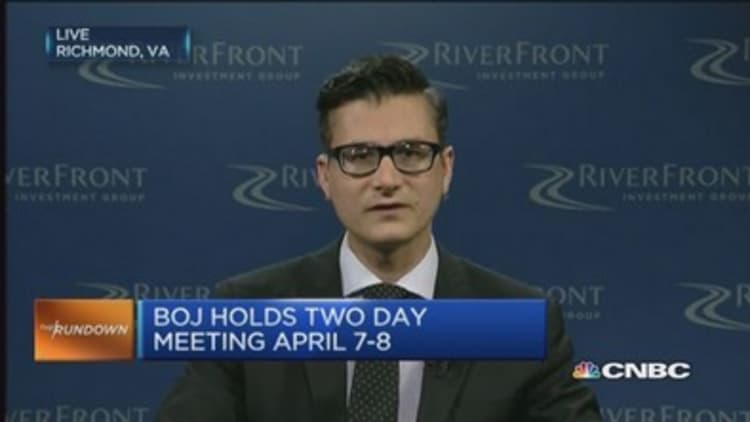Long-term foreign investors are jumping on a seemingly unstoppable Nikkei rally amid expectations that Japan's famously frugal companies will start coughing up more cash to shareholders, analysts say.
"Many long-term global investors have been neutral or underweight on Japan equities but are now catching up to lock in the relatively higher earnings growth visibility," BNP Paribas chief Japan equity strategist Shun Maruyama told CNBC. "With dividends and share buybacks also expected to rise, cash equities buying by foreign investors is expected to continue in a sustained way."
The Nikkei has been on a roll of late, up 19 percent year-to-date after surging 65.9 percent across 2013-2014.
Foreign investors are behind the index's 7.4 percent rally since the beginning of March. They poured 822 billion yen ($6.83 billion) into Japanese stocks, the biggest jump in four months, according to an April 8 Nomura research note.
"Foreign investors are just playing catch up because they don't want to miss the bus," said Sunrise Brokers' head of Japan and Asian equities Ben Collett.
Not just about QE
Unlike previous rallies that were triggered by the Bank of Japan's monetary easing, investors are focused on another Abenomics policy this time: corporate governance reform.
"Overseas investors had [far fewer] questions about Bank of Japan policy, but there was keen interest in deregulation and the next steps in beefing up corporate governance," UBS economist Daiju Aoki said in a note on April 8.

Investors are closely watching what companies will do with their mammoth cash piles. Japanese companies were hoarding a record 223 trillion yen of cash on their balance sheets in 2014, according to a Societe Generale note published on Thursday.
All that is now changing, however, as reforms backed by Abe's government have put a renewed emphasis on return on equity.
In 2014, Japan Inc returned 3.7 trillion yen to shareholders through share buybacks, according to Societe Generale's estimates.
All of which has prompted long-term foreign investors to take a closer look at individual companies and take the plunge into buying individual stocks, instead of tentatively re-entering the market through currency hedged stock futures, said BNP Paribas' Maruyama.
Tentative recovery
However, analysts are divided over how long the momentum will continue.
While the Government Pension Investment Fund of Japan and other public pension funds are expected to provide a floor to stock prices, the Nikkei may have risen too far too fast, said BNP Paribas' Maruyama, who sees a correction in late April and May when companies will announce results and earnings outlooks.
He expects the Nikkei to end the year at 22,000 and to rise to 24,000 by the end of 2016.
Others are more bullish, however. With earnings growth of up to 20 percent on the horizon, the only strategy is to buy on the dip, said Sunrise Brokers' Collett.
There is "a 50 percent chance the Nikkei will rise to 30,000 in a year's time," he said.

